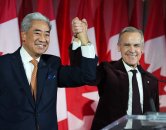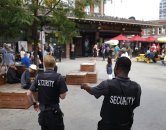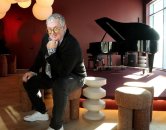Stay informed
'Not an Indian at all': Author Thomas King reveals he has no Indigenous roots
Author Thomas King, long-celebrated for work rooted in what he believed was his partial Cherokee heritage, has revealed that he has no Indigenous ancestry to speak of.
The American-born, Canada-based writer, scholar and activist made the admission in a repentant guest essay for The Globe and Mail on Monday titled “A most inconvenient Indian,” a reference to his 2012 best-selling non-fiction work The Inconvenient Indian: A Curious Account of Native People in North America.
Prompted by recent “rumours” of a dubious ancestry, King wrote that he took it upon himself to get in touch with the Tribal Alliance Against Frauds (TAAF), an American Cherokee organization he would come to discover was the very source of those rumours.
He explained how he learned the truth during a video call in mid-November with TAAF’s current director, Lianna Costantino, and a genealogist who consults for TAAF on a volunteer basis. Also on the line was Daniel Heath Justice, a Cherokee scholar at the University of British Columbia.
A call from which he’s “still reeling.”
“At 82, I feel as though I’ve been ripped in half, a one-legged man in a two-legged story,” he wrote. “Not the Indian I had in mind. Not an Indian at all.”
HarperCollins Canada, King’s publisher for more than 30 years, told the Globe it stands by the author. The publisher said it had no further comment when contacted by National Post, but had passed an interview request along to King.
Born in central California in 1943, King was the son of Kathryn Konsalas, a woman with Greek heritage, and Robert Elvin King, originally from Oklahoma, who was stationed out west during the Second World War. His parents met at a USO dance and had two children, King and his younger brother Christopher.
His father, however, abandoned his wife and sons when King was just three years old.
Growing up, King explained that he and his brother had “much darker” complexions than other family members and that he himself “looked somewhat Asian.”
He didn’t have any inkling of Indigenous roots until he told his mother that neighbourhood kids were calling him a derogatory term for Japanese people.
“No, she told me, you’re not Japanese. Your father is part Cherokee. That’s what the kids are seeing.”
In the years that followed, he put together “an intriguing if somewhat fractured story” of his father’s history as it relates to his own identity.
As he understood, his father discovered that his own father was not William King, but a man named Elvin Hunt who was allegedly part Cherokee. Upon learning this, King’s father reportedly split from the family and they “never reconciled.”
Decades later, now in their 60s, the King brothers tracked down their father’s sister, who also confirmed Hunt’s lineage.
Although his own ensuing research into the Hunt family genealogy never yielded any definitive evidence of a Cherokee link, TAAF’s genealogist, he wrote, uncovered absolutely none on the Hunt or King side.
“As you might expect, I didn’t want to believe her. I was sure she had made an error in her research, hadn’t gone back far enough, but as she talked about what she had found, as we matched the pieces of family history that I had with the pieces of family history that she uncovered, it became clear that the one piece missing was any connection to the Cherokee.”
King wrote that he won’t continue to fraudulently identify as part Cherokee, but he also won’t apologize for having lived his life under the belief, feeling that doing so is an admission of “a crime, an offence, a misdeed.”
He also vehemently denied knowing about his uncertain ancestry all along and maintaining the fraud “for fame and profit.”
But he did admit to having “ benefitted from being considered Native American” and is expecting the inevitable fallout from the truth being revealed.
“This pretty much means the end of me. It’s a brutal end, and I expect the worst,” he told The Globe and Mail in a separate news story .
Also Monday, after consulting with Indigenous communities and groups, the Edmonton Opera cancelled its planned production of Indians on Vacation, based on King’s novel that won the 2021 Stephen Leacock Memorial Medal for Humour.
“Our decision to step back was based on the overall environment of tension and division that emerged around the project, not on any single viewpoint or claim,” the opera said in a statement that doesn’t name King specifically. “The goal was to prioritize safety, trust, and care within our community.”
King, who moved to Canada in 1980 to teach at the University of Lethbridge in Alberta, was made a member of the Order of Canada in 2004. He was elevated to Companion of the Order in 2020. He resides in Guelph, Ont.
He becomes the latest prominent Canadian whose Indigenous ancestry has been called into question, notably singer-songwriter Buffy Sainte-Marie and former federal cabinet minister Randy Boissonault.
Our website is the place for the latest breaking news, exclusive scoops, longreads and provocative commentary. Please bookmark nationalpost.com and sign up for our newsletters here.




Comments
Be the first to comment